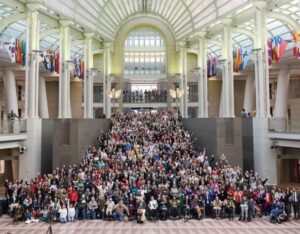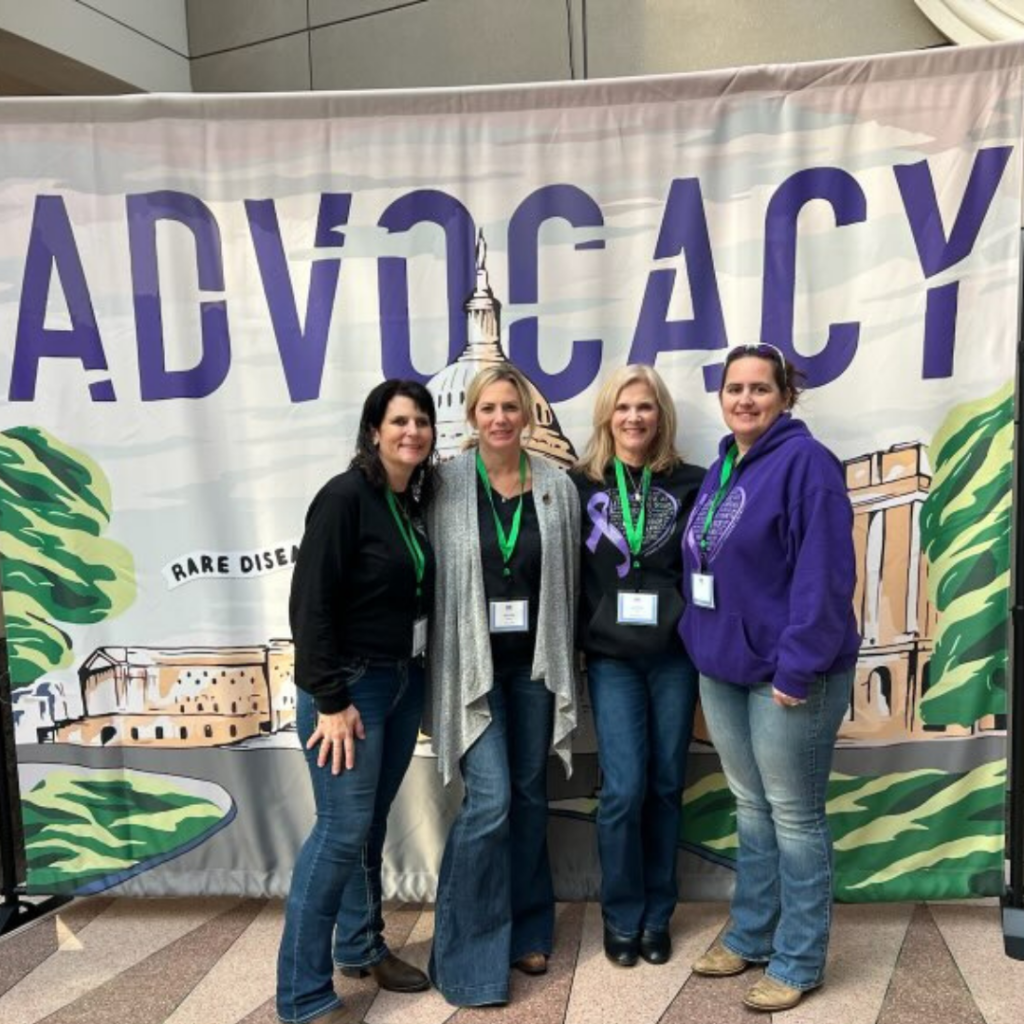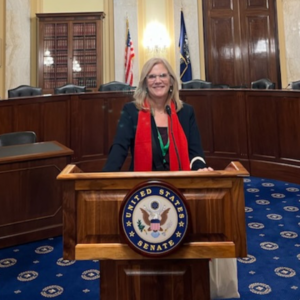Rare Disease Week 2024
 Every year on the last day of February, the rare disease community unites as one to observe Rare Disease Day. February is a rare month with only 28 days and this February was ultra rare with the extra day, February 29th, a day that only occurs once every four years.
Every year on the last day of February, the rare disease community unites as one to observe Rare Disease Day. February is a rare month with only 28 days and this February was ultra rare with the extra day, February 29th, a day that only occurs once every four years.
The Orphan Drug Act has determined a rare disease as a condition that affects fewer than 200,000 individuals in the United States. Lennox-Gastaut Syndrome (LGS) is one of many rare epilepsy syndromes with our own population numbering approximately 50,000 in the U.S.
Once again, as we did in 2023, advocates from the LGS Foundation made our way to Washington, D.C. to participate in Rare Disease Week on Capitol Hill hosted by the EveryLife Foundation for Rare Diseases. It was here that we learned of current legislation aimed at supporting initiatives impacting the rare disease community.
Accompanied by three powerful LGS Moms, Jamie Riley (New Hampshire), Sandy Reynolds (Pennsylvania), and Jennifer Fischer (Minnesota), we began our first day at the Reagan Building for the RDLA Legislative Conference. The tagline this year was Unify, Amplify, Stronger Than Ever.
It was here that we learned of the 5 legislative ‘asks’ recommended:
- Support the Creation of an Interagency Coordinating Committee for Rare Diseases. By convening multiple agencies on topics related to public health and in specific disease areas, the interagency committees would elevate the awareness of the associated issues, provide forums for collaboration across agencies and ensure effective and efficient resource utilization. This Committee encourages the Secretary of Health and Human Services (HHS) to provide additional leadership to better coordinate these efforts across the federal government.
- Cosponsor the Accelerating Kids’ Access to Care Act (AKACA) H.R. 4758/S. 2372. More than half of children in the U.S rely on Medicaid and the Children’s Health Insurance Program (CHIP) for their health insurance coverage. But bureaucratic rules in these programs often limit kids’ ability to get timely treatment outside of their home state. The AKACA will allow pediatric providers to enroll more efficiently in multiple state Medicaid programs for a 5-year period.
- Cosponsor the Creating Hope Reauthorization Act (H.R. 7384). This bill will reauthorize the Rare Pediatric Disease Priority Review Voucher (PRV) program for four years, ensuring this vital incentive that has no cost to taxpayers can continue to spur innovation in rare diseases that disproportionately affect children.
- Cosponsor and Advance the Safe Step Act (S. 652/H.R. 2630). A medication step therapy protocol establishes a specific sequence in which a group health plan or a health insurance provider covers prescription drugs often requiring patients to try and fail an insurer’s preferred medication before being covered by the physician-prescribed medication. This can often lead to adverse health events which can lead to costly hospitalizations. The Safe Step Act works to establish an exception process to medication step therapy protocol.
- Ask members to join the Rare Disease Congressional Caucus. This is a bipartisan, bicameral (both houses of Congress) caucus that works to raise awareness of rare diseases.
- Additionally, we could also have our own asks related to our own rare disease. In our case, there is a relatively new bicameral Congressional Epilepsy Caucus. When I met with representatives I asked them to join this caucus that raises awareness of the many forms of epilepsy and promotes the needs of people with epilepsy through legislation and appropriations. The caucus would also work to ensure access to care, treatments and devices, and advance data, research, and innovation to better understand and treat the epilepsies.
Following a full day of learning and a good night’s sleep, we made our way to Capitol Hill to meet with our Senators and House Representatives. We went our separate ways to meet with our state’s legislators. Thankfully, EveryLife Foundation schedules the meetings for us and we just show up ready to make the ask.
My own representative’s office was closed for the day so, after slipping my one-pager ask through his mail slot, I met with my scheduled meeting with a Congressman from a different district. After meeting with this representative I just didn’t feel done so I pretty much ‘crashed’ a few other meetings. Well, four other meetings. I knew I would be the only one speaking about the Epilepsy Caucus so I felt I needed to get the word out to California lawmakers.
My last meeting was with Senator Alex Padilla’s policy director. The Senate meetings are big because all of your state’s advocates attend these meetings. As it turns out, the policy director said he was also from Santa Barbara where I live. He looked about the same age as my daughters so I asked him if he knew them and he did. That’s a good thing. If I reach out to him in the future, hopefully he’ll remember me. It helps that the last name of my children is a pretty memorable one, Apostolopoulos. I mean, how can you forget that?!
It’s important to note that you don’t have to know everything about every ask. You speak to the one that resonates with your story. When I followed up with the other LGS advocates, Jamie Riley told me that she spoke about the frustrations she’s experienced in her attempts to get a safety bed for her son, Andrew. Her insurance company is denying this necessary equipment and her representatives need to be made aware of this. Both Jamie and I had an unfortunate experience in that, when we showed up for one of our meetings, we had to take them in the hallway with people milling about. This is not ideal as we’re sharing very personal information but it’s not unusual.
Sandy met another advocate in her group who spoke of the Airline Bill of Rights which became relevant to our community only days later when we learned of one of our own families having their daughter’s wheelchair damaged by airline baggage handlers. Sandy’s personal ‘ask’ is one that resonates throughout the LGS community. She asked for legislation to create adult changing tables for our grown loved ones who still require diapers. This is incredibly important and protects the dignity of all people with disabilities who encounter the shameful process of diaper changing on a dirty bathroom floor.
I would say that the most hopeful I felt was when I heard Jennifer Fischer’s story. Her Senator, Amy Klobuchar met with the Minnesota group. This is quite unusual since we normally end up meeting with staffers, although there’s nothing wrong with that either. Senator Klobuchar took them on a private tour of some of the more distinguished senate locations. When Jennifer spoke of her inability to refill one of her son’s brand name medications due to insurance insisting on a generic drug, the Senator instructed her staff to look into this personally. Advocacy at its best!!
Once again, we were able to share our stories and we were heard. I encourage others in our community to join future advocacy efforts. I know this always seems a bit daunting to families. It can be intimidating to speak with these powerful people but remember, when they’re at home with their families, their lives may also have unique challenges. All of our lives do. They’re human like you and me. And don’t forget, they work for us and so, they must listen to us. And perhaps surprisingly, many of them really do care.
The truth is, the future is never going to be brighter if we don’t raise our voices to make it that way. We need more advocates from the LGS community. We have training available and we will be offering an Advocacy Workshop at our upcoming conference. If you ever think of yourself as ‘just one person who couldn’t possibly make a difference’, think again.
 Remember, when we Unify & Amplify our voices, we are Stronger Than Ever.
Remember, when we Unify & Amplify our voices, we are Stronger Than Ever.
Jennifer Griffin, Director of Family Support, LGS Foundation and, most importantly, Theo’s Mom
Interested in advocating for LGS? Join our Advocates for LGS team today!
Updated 11/26/24 (KK)
